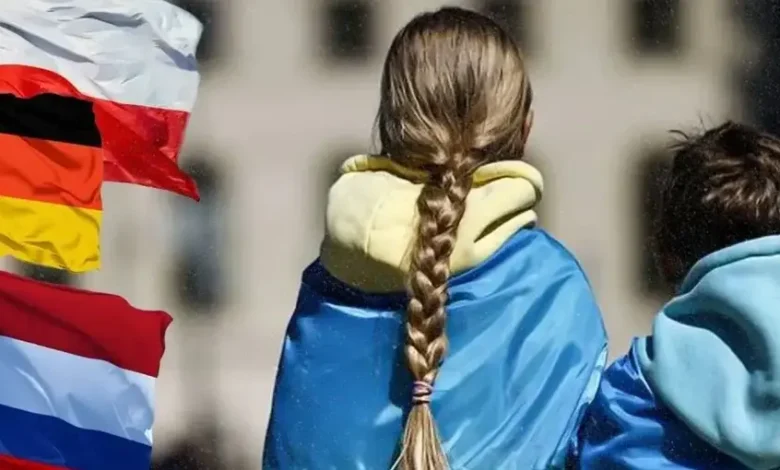80% of Europeans agree that the EU should accept Ukrainian refugees

The full-scale war in Ukraine has become not only the largest humanitarian crisis in Europe since World War II, but also a test of resilience for the European Union itself. Since 2022, millions of Ukrainians have been forced to leave their homes and cross EU borders to escape hostilities. In response, Europe, for the first time in history, unanimously introduced a temporary protection mechanism, giving Ukrainians access to social services, education, the labor market, and medicine. The war is in its fourth year, but the scale of support remains high both at the level of political decisions and at the level of public sentiment. This is evidenced by a new Eurobarometer survey conducted in the spring of 2025.
A new Eurobarometer survey released in May 2025 recorded the highest level of support for the European Union among its citizens in the last two decades – 52% of respondents said they trust the EU, and 75% consider themselves European. But something else turned out to be even more important for Ukraine: 80% of respondents agreed that the EU should accept people fleeing the war in Ukraine, and 76% supported the provision of humanitarian and financial aid to Ukrainians. About this reported on the website of the European Commission with reference to the results of the Eurobarometer survey. This testifies to the stable commitment of the public opinion of the EU countries to support not only the Ukrainian state, but also Ukrainians as part of the European space.
While Russian aggression remains the most important challenge for the EU (45% of respondents rated it as such, the highest rate among all problems), almost three years of war have not changed the principled attitude of most Europeans towards refugees from Ukraine. In many countries, despite local concerns about migration, Ukrainians remain a separate category — people who are not just looking for a better life, but escaping from war. This difference in perception is fundamental. It means: Ukrainians can count on help, but at the same time they must understand that further integration into the new environment depends on their own activity and the ability to adapt to the system of the host countries.
Key findings from the survey: context for refugees
The Eurobarometer survey, conducted from March 26 to April 22, 2025 among more than 26,000 citizens of 27 EU member states, recorded that:
- 80% support the reception of Ukrainian refugees;
- 76% — humanitarian and financial aid to Ukraine;
- 72% — economic sanctions against Russia;
- 59% — supply of military equipment to Ukraine at the expense of the EU;
- 60% — giving Ukraine the status of a candidate for joining the EU;
- 41% called peace the main European value, and 33% – democracy and the rule of law.
These data show that Ukrainians remain not only in the focus of the political priorities of the EU, but also in the center of moral and civil solidarity. But such support is accompanied by an expectation of certain behavior on the part of the refugees themselves: transparency, respect for rules, willingness to integrate and be responsible members of communities.
Recommendations for Ukrainian refugees
- Use all available legal channels of assistance.
In most EU countries, Ukrainians who have temporary protection have the right to residence, access to education, medical care and work. But the mechanisms of this assistance differ between states. It is important for refugees to navigate local rules, check the validity of documents, register with relevant structures, avoid illegal services and shadow work.
- Learn the language of the host country.
One of the main expectations from refugees in the EU is readiness for integration. In many countries (Germany, the Czech Republic, France, Austria, Poland), language courses for Ukrainians are available for free or at reduced prices. Don’t miss the opportunity — language adaptation opens the door to education, skilled work, and legal security.
- Be wary of abuse of trust.
Although the support of Ukrainians in the EU remains high, it is not unconditional. The behavior of individual refugees, related to the violation of legislation or the questionable use of social benefits, has already become the subject of media discussions in some countries. In order to maintain trust, it is important to follow the rules, not to create conflicts and, on the contrary, to demonstrate a willingness to coexist with local communities.
- Protect the special status of the Ukrainian refugee.
European legislation distinguishes refugees from Ukraine from other migrants. This status is based on direct armed conflict and temporality, not economic motivation. That is why it is important to avoid distortions and clearly justify your stay, especially when renewing documents or when crossing borders.
- Do not ignore civil initiatives.
Attending local events, helping volunteers, participating in school or professional programs — all this helps to form a positive image of the Ukrainian community. Many cities have joint integration projects, and participation in them can be as important as status or aid.
The level of support for Ukrainians in EU countries remains high even in the fourth year of the war. But this does not mean that the situation will not change. As the experience of other crises shows, the support of public opinion is a resource that needs to be used responsibly. Ukrainian refugees in Europe today are not only recipients of aid, but also representatives of their state in the eyes of millions of Europeans. And that is why daily actions — legal, social, communicative — shape not only personal perspectives, but also the future coexistence of Ukraine with the European Union.





